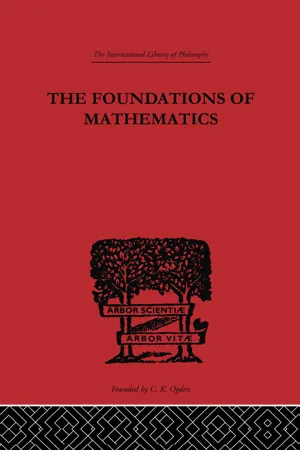![]()
I
THE FOUNDATIONS OF MATHEMATICS (1925)
PREFACE
The object of this paper is to give a satisfactory account of the Foundations of Mathematics in accordance with the general method of Frege, Whitehead and Russell. Following these authorities, I hold that mathematics is part of logic, and so belong to what may be called the logical school as opposed to the formalist and intuitionist schools. I have therefore taken Principia Mathematica as a basis for discussion and amendment; and believe myself to have discovered how, by using the work of Mr. Ludwig Wittgenstein, it can be rendered free from the serious objections which have caused its rejection by the majority of German authorities, who have deserted altogether its line of approach.
CONTENTS
(1) INTRODUCTION
(2) PRINCIPIA MATHEMATICA
(3) PREDICATIVE FUNCTIONS
(4) FUNCTIONS IN EXTENSION
(5) THE AXIOMS
I. INTRODUCTION
In this chapter we shall be concerned with the general nature of pure mathematics,2 and how it is distinguished from other sciences. Here there are really two distinct categories of things of which an account must be given—the ideas or concepts of mathematics, and the propositions of mathematics. This distinction is neither artificial nor unnecessary, for the great majority of writers on the subject have concentrated their attention on the explanation of one or other of these categories, and erroneously supposed that a satisfactory explanation of the other would immediately follow.
Thus the formalist school, of whom the most eminent representative is now Hilbert, have concentrated on the propositions of mathematics, such as ‘2 + 2 = 4’. They have pronounced these to be meaningless formulae to be manipulated according to certain arbitrary rules, and they hold that mathematical knowledge consists in knowing what formulae can be derived from what others consistently with the rules. Such being the propositions of mathematics, their account of its concepts, for example the number 2, immediately follows. ‘2’ is a meaningless mark occurring in these meaningless formulae. But, whatever may be thought of this as an account of mathematical propositions, it is obviously hopeless as a theory of mathematical concepts; for these occur not only in mathematical propositions, but also in those of everyday life. Thus ‘2’ occurs not merely in ‘2 + 2 = 4’, but also in ‘It is 2 miles to the station’, which is not a meaningless formula, but a significant proposition, in which ‘2’ cannot conceivably be a meaningless mark. Nor can there be any doubt that ‘2’ is used in the same sense in the two cases, for we can use ‘2 + 2 = 4’ to infer from ‘It is two miles to the station and two miles on to the Gogs’ that ‘It is four miles to the Gogs via the station’, so that these ordinary meanings of two and four are clearly involved in ‘2 + 2 = 4’. So the hopelessly inadequate formalist theory is, to some extent, the result of considering only the propositions of mathematics and neglecting the analysis of its concepts, on which additional light can be thrown by their occurrence outside mathematics in the propositions of everyday life.
Apart from formalism, there are two main general attitudes to the foundation of mathematics: that of the intuitionists or finitists, like Brouwer and Weyl in his recent papers, and that of the logicians—Frege, Whitehead, and Russell. The theories of the intuitionists admittedly involve giving up many of the most fruitful methods of modern analysis, for no reason, as it seems to me, except that the methods fail to conform to their private prejudices. They do not, therefore, profess to give any foundation for mathematics as we know it, but only for a narrower body of truth which has not yet been clearly defined. There remain the logicians whose work culminated in Principia Mathematica. The theories there put forward are generally rejected for reasons of detail, especially the apparently insuperable difficulties connected with the Axiom of Reducibility. But these defects in detail seem to me to be results of an important defect in principle, first pointed out by Mr Wittgenstein.
The logical school has concentrated on the analysis of mathematical concepts, which it has shown to be definable in terms of a very small number of fundamental logical concepts; and, having given this account of the concepts of mathematics, they have immediately deduced an account of mathematical propositions—namely, that they were those true propositions in which only mathematical or logical concepts occurred. Thus Russell, in The Principles of Mathematics, defines pure mathematics as ‘the class of all propositions of the form “p implies q” where p and q are propositions containing one or more variables, the same in the two propositions, and neither p nor q contains any constants except logical constants’.3 This reduction of mathematics to symbolic logic was rightly described by Mr. Russell as one of the greatest discoveries of our age 4; but it was not the end of the matter, as he seemed to suppose, because he was still far from an adequate conception of the nature of symbolic logic, to which mathematics had been reduced. I am not referring to his naive theory that logical constants were names for real objects (which he has since abandoned), but to his belief that any proposition which could be stated by using logical terms5 alone must be a proposition of logic or mathematics.6 I thin...
